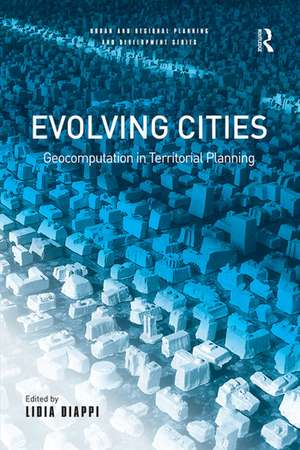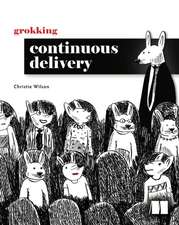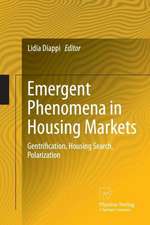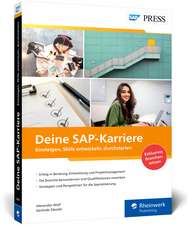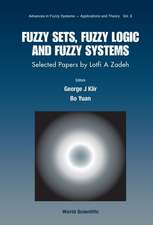Evolving Cities: Geocomputation in Territorial Planning: Urban and Regional Planning and Development Series
Editat de Lidia Diappien Limba Engleză Paperback – 27 feb 2017
| Toate formatele și edițiile | Preț | Express |
|---|---|---|
| Paperback (1) | 469.34 lei 6-8 săpt. | |
| Taylor & Francis – 27 feb 2017 | 469.34 lei 6-8 săpt. | |
| Hardback (1) | 1000.27 lei 6-8 săpt. | |
| Taylor & Francis – 21 oct 2004 | 1000.27 lei 6-8 săpt. |
Preț: 469.34 lei
Nou
Puncte Express: 704
Preț estimativ în valută:
89.81€ • 96.04$ • 74.88£
89.81€ • 96.04$ • 74.88£
Carte tipărită la comandă
Livrare economică 18 aprilie-02 mai
Preluare comenzi: 021 569.72.76
Specificații
ISBN-13: 9781138266605
ISBN-10: 1138266604
Pagini: 248
Dimensiuni: 156 x 234 x 13 mm
Greutate: 0.45 kg
Ediția:1
Editura: Taylor & Francis
Colecția Routledge
Seria Urban and Regional Planning and Development Series
Locul publicării:Oxford, United Kingdom
ISBN-10: 1138266604
Pagini: 248
Dimensiuni: 156 x 234 x 13 mm
Greutate: 0.45 kg
Ediția:1
Editura: Taylor & Francis
Colecția Routledge
Seria Urban and Regional Planning and Development Series
Locul publicării:Oxford, United Kingdom
Cuprins
Contents: Introduction, Lidia Diappi. The Spatial Investigation Capabilities of Neural Networks: Neural classifiers for land cover recognition: merging radiometric and ancillary information, Silvio Griguolo; Spatial interaction modelling: neural network methods and global optimization, Manfred Fischer and Katerina Hlavackova-Schindler; Complexity in sustainability: an investigation of the Italian urban system through self reflexive neural networks, Lidia Diappi, Massimo Buscema and Michela Ottanà . Land Use Dynamics Through Artificial Intelligence Tools: Knowledge discovery and data mining to investigate urban and territorial evolution: tools and methodologies, Francesco Bonchi, Silvana Lombardo and Serena Pecori; Learning about land use change in Rome and Pisa urban areas, Francesco Bonchi, Silvana Lombardo, Serena Pecori and Alessandro Santucci; The identification and simulation of the urban spatio-temporal dynamic: the case study of Rome, Ferdinando Semboloni; Appendix: an overview of the SSI handbook, Robert Gianassi; Land use dynamics: a stochastic forecasting model based on SOM neural nets knowledge, Lidia Diappi and Paola Bolchi. Multi Agent Systems: Interactions Among Actors and Their Behaviours: Multi agent simulations for traffic in regional planning, Kai Nagel and Bryan Raney; Traffic-related air pollution in an urban environment: a KBDSS for improving the decisional context, Emilia Conte and Grazia Concilio; The chaotic nature of urban neighbourhood evolution, Chris Webster; Index.
Notă biografică
Lidia Diappi is a Professor in the Department of Architecture and Planning at the Polytechnic of Milan, Italy.
Recenzii
’New methods of computation based on objects are giving us new insights into how cities grow and evolve. A new generation of urban models which fuse such techniques with advances in geographic information systems are the result. This book is as good a snapshot of the state of the art as you will find. Important reading for geographers, city planners and computer scientists alike.’ Professor Michael Batty, University College London, UK ’Evolving cities is a splendid example of how a spatially integrated social science can enhance our insights in urban dynamics. It is an exciting introduction to new methods handling complex geographical information, as neural networks or multi-agents systems. A group of European researchers at the cutting edge of their field demonstrate the usefulness of these new approaches in urban simulation and modelling. Students and researchers as well as technicians of urban planning will find...enlightening views.’ Professor Denise Pumain, Université Paris I, France and Editor of Cybergeo (European Journal of Geography) ’...a well-structured book...a useful resource for those interested in GC issues as well as those interested in urban and regional dynamics.’ Environment and Planning B: Planning and Design
Descriere
Bringing together the leading researchers into 'geocomputation', this edited volume provides an up-to-date overview of the development of new artificial intelligence principles and technologies used for the analysis, development and evaluation of urban planning policies and programmes.
